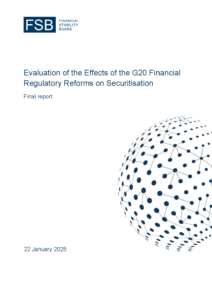Press enquiries:
+41 61 280 8477
[email protected]
Ref: 3/2025
- Minimum risk retention and higher prudential requirements have contributed to the resilience of the residential mortgage-backed securities (RMBS) and collateralised loan obligation (CLO) securitisation markets, without strong evidence of material negative side-effects on financing to the economy.
- Report notes recent growth in CLOs and warns that the post-GFC securitisation market has not yet been tested through a full credit cycle.
- The evaluation identifies issues for consideration by national authorities and international bodies, such as the need to monitor risks from recent market developments and the role of risk retention and third-party financing for CLOs.
The Financial Stability Board (FSB) today published the final report of its Evaluation of the Effects of the G20 Financial Regulatory Reforms on Securitisation. The report focuses on the International Organization of Securities Commissions (IOSCO) minimum retention recommendations and the Basel Committee on Banking Supervision (BCBS) revisions to prudential requirements for bank securitisation-related exposures in RMBS and CLO markets.
The evaluation finds that these reforms, introduced in the aftermath of the 2008 global financial crisis (GFC), have contributed to the resilience of the securitisation market without strong evidence of material negative side-effects on financing to the economy. Complex structures that contributed to the GFC – including securitisations of subprime assets, collateralised debt obligations and re-securitisations – have declined significantly, while the securitisation market is more transparent. However, the market has not yet been tested through a full credit cycle to fully confirm the evidence on enhanced resilience. This is particularly relevant for CLOs that have grown significantly in recent years but have not yet experienced a prolonged downturn.
The reforms appear to have contributed to a redistribution of risk from banks to the non-bank financial intermediation (NBFI) sector, with banks shifting towards higher-rated tranches. This redistribution of risk has been driven both by an increase in non-bank financing of the economy and by the growth of non-bank investors in securitisations. Risk transfer for investors is more evident in the CLO than the RMBS market. The financial stability impact of this trend is difficult to assess since it is not always clear if the non-bank entities taking on the risks are well-placed to assume them given their funding structure and ability to withstand losses in stress events.
The report highlights key issues for national authorities and international bodies to consider:
- the need to monitor risks in securitisation markets in light of developments such as the growth of synthetic risk transfers and private credit in securitisation structures;
- the effectiveness of risk retention requirements for risk alignment in CLOs, given the fact that a large part of the global CLO market does not currently operate under such requirements and given the use of third-party risk financing for CLO structures; and
- differences in reform implementation across FSB member jurisdictions, whose impact needs to be considered as authorities explore opportunities for framework adjustments.
Benjamin Weigert, Director General for Financial Stability at the Deutsche Bundesbank and Chair of the FSB group that carried out the evaluation, said “The evaluation highlights the importance of the G20 reforms in enhancing securitisation market resilience. Nonetheless, recent market developments reinforce the need for authorities to monitor risks and to ensure the alignment of incentives between securitisation originators, sponsors and investors.”
Ryozo Himino, Deputy Governor at the Bank of Japan and Chair of the Standing Committee on Standards Implementation that oversaw the preparation of the report, said “Evaluations are a core part of the FSB’s mandate, as they help us to assess whether agreed reforms are achieving their intended outcomes and identify any material unintended consequences that may have to be addressed. This was the FSB’s first streamlined evaluation, focusing on the most relevant securitisation reforms and market segments from a financial stability perspective.”
Notes to editors
The evaluation assesses the extent to which the BCBS and IOSCO securitisation reforms have achieved their financial stability goals by reducing misaligned incentives and moral hazard. It also examines the broader effects of the reforms on the functioning and structure of securitisation markets and the financing of the real economy. It draws on a broad range of information sources and analytical approaches, including responses to a questionnaire by FSB member jurisdictions; input from stakeholders; a literature review; dialogue with academics; and various quantitative indicators and analyses on the effects of reforms using different datasets. These sources, taken together, form the basis for the conclusions in the report.
This final report reflects feedback received on a consultative version of the report, which the FSB published in July 2024. An overview of responses to the FSB’s public consultation was also published today.
The evaluation was undertaken using the FSB’s framework for the post-implementation evaluation of the effects of the G20 financial regulatory reforms. This is the fifth evaluation under the FSB framework. All completed evaluations are published on the FSB website.
The FSB coordinates at the international level the work of national financial authorities and international standard-setting bodies and develops and promotes the implementation of effective regulatory, supervisory, and other financial sector policies in the interest of financial stability. It brings together national authorities responsible for financial stability in 24 countries and jurisdictions, international financial institutions, sector-specific international groupings of regulators and supervisors, and committees of central bank experts. The FSB also conducts outreach with approximately 70 other jurisdictions through its six Regional Consultative Groups.
The FSB is chaired by Klaas Knot, President of De Nederlandsche Bank. The FSB Secretariat is located in Basel, Switzerland and hosted by the Bank for International Settlements.
